Papers by Kasper Hoffmann
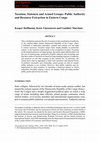
This contribution analyses the role of taxation in the constitution of authority in the conflict-... more This contribution analyses the role of taxation in the constitution of authority in the conflict-ridden eastern Democratic Republic of the Congo, where a multitude of authorities alternately compete and collude over the right to extract resources. Taxation ranges from simple plunder, to protection rackets, to the material reciprocation of the recognition of rights. Focusing on the taxation practices of armed groups, the article argues that taxation is at the core of armed groups' production of public authority and citizenship, and that their modes of taxation are based on long-standing registers of authority and practices of rule that originate in the colonial era. In particular, the article shows that by appealing to both local customary and national forms of political community and citizenship, armed groups are able to assume public authority to tax civilians. However, their public authority may be undermined by their tendency to reproduce a historical pattern in which authorities forcefully impose a heavy tax burden, while providing limited public goods and services in return.
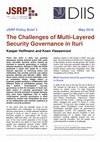
There has been a slow, but growing awareness among external actors that some local non-state secu... more There has been a slow, but growing awareness among external actors that some local non-state security actors should be involved in security governance in conflictaffected situations. Already in 2006, the OECD published a report that called for a 'multilayered' approach to reforming actors and institutions that provide security and justice services (Scheye and McLean, 2006). Often these actors consist of local authorities, such as customary chiefs, village elders, or business people working in collaboration with different kinds of self-defense groups. The idea behind 'multi-layered' security governance is that the inclusion of local nonstate actors in security governance will improve security provision to people because they have more legitimacy. But in reality 'multi-layered' security governance is often marked by conflict and competition as much as by collaboration and common solutions to people's security problems.

For more than 20 years, Kalehe and Walikale, two territories connecting the provinces of North an... more For more than 20 years, Kalehe and Walikale, two territories connecting the provinces of North and South Kivu, have been characterized by a proliferation of armed groups. The first of these groups emerged during the Masisi war in North Kivu, which pitched autochthonous1 and migrant communities against each other and affected ethnic cohabitation in Kalehe and Walikale. During the Congolese wars, these armed groups evolved into one of the leading Mai-Mai groups, which occupied vast parts of both territories and installed its own structures of dominance. The start of the peace process in 2003 did not put an end to the local process of militarization. While in Walikale part of the former Mai-Mai movement transformed into the Mai-Mai Kifuafua, the successful campaigns of the Raia Mutomboki against the Forces démocratiques de libération du Rwanda (FDLR, Democratic Forces for the Liberation of Rwanda) in Shabunda eventually also spread to Kalehe and Walikale. Although the FDLR has been largely ousted from both territories, the Raia Mutomboki continues to be a key player in the local political and military landscape and has become deeply involved in different domains of public life, including the provision of protection, conflict resolution and taxation.
This report analyses the involvement of these armed groups in public life in the territories of Kalehe and Walikale, which is the outcome of the intersection of a number of local historical processes with larger national and regional dynamics. The current political and military landscape in these territories, defined by the presence of armed groups and the consequent fragmentation of local authority, is mainly caused by unresolved tensions between and within communities over territory, authority and resources; the lack of capacity of the Congo’s state services to provide protection; and the limited success of reintegration efforts. The report explores how these armed groups are embedded inlocal communities, how they are connected to local power struggles and how they are involved in the exercise of local authority, including in the fields of security, dispute resolution and revenue generation. Armed groups are able to mobilize popular support by evoking two issues of existential importance to local communities—marginalization and security. While the former revolves around the historical marginalization of local communities in politics and governance, the latter frames local communities as in need of protection. These issues give meaning to armed groups’ bids for local authority and legitimize their engagement in a wide range of governmental practices normally ascribed to the state, such as taxation and the provision of justice and security.
Armed groups have evolved into dominant power brokers, which are deeply involved with ruling territory, people and resources. They have become part and parcel of local and sometimes national power dynamics, have colluded with local and national political and customary leaders, and have developed different techniques and strategies to impose or sustain their authority. The end result is further militarization and fragmentation of public space and social interactions.
In order to reverse this dynamic and promote a demilitarization of public life in Walikale and Kalehe, it is first essential to address the civilian support networks of armed groups. It is then equally important to deal with more structural causes of militarization, including the conduct of the security forces, and to promote more transparent and accountable state institutions. Two other issues that are interconnected and require specific attention are the return of refugee populations and disputes over landownership. These cannot be resolved without a genuine national land reform process, which requires the mobilization of the necessary political will and technical capacity.
Page 1. MILITARISED BODIES AND SPIRITS OF RESISTANCE Armed Governmentalities and the Formation of... more Page 1. MILITARISED BODIES AND SPIRITS OF RESISTANCE Armed Governmentalities and the Formation of Militarised Subjectivities in South Kivu/DR Congo: The case of the Maï-Maï group of General Padiri Master Dissertation ...

Rebels may set myths into motion when they govern civilians. Rebels who want to overturn the soci... more Rebels may set myths into motion when they govern civilians. Rebels who want to overturn the socio-political order often incorporate its values, beliefs, representations, and practices into their governance of civilians. In doing so they govern through some of the myths underpinning that order. Many of these operate on an unreflective level among both rebels and local residents. Deploying these enables rebels to cultivate legitimacy among civilians whose support they solicit. But the novelty of rule by rebels is that it recasts existing values and beliefs into new political narratives that shape rebel governance profoundly. Drawing on a mixture of nationalist, pre-colonial, and Christian values and beliefs, General Padiri’s Mai Mai militia group from South Kivu in eastern Congo produced a mythical narrative, forged around divine authority and the bipolar relation between autochthony and foreignness. This syncretic mythical narrative resonated deeply within the local society. It endowed Padiri with charismatic authority and enabled a highly centralized, authoritarian, and coercive form of rebel governance.
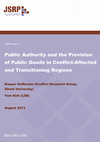
This paper uses a systematic literature review to suggest that three emerging critical approaches... more This paper uses a systematic literature review to suggest that three emerging critical approaches to the production of public authority are identifiable within the contemporary literature on conflict-affected and transitioning regions. We term these approaches the ‘public authority from below perspective’, the ‘hybrid political orders lens’, and ‘political settlements analysis’. Although hailing from diverse disciplinary backgrounds, it will be shown that these approaches share important traits. First, they suggest that to better understand the nature of public authority in transitioning and conflict-affected regions it is necessary to uncover how public authority actually works rather than departing from a theory of the state. This includes accounting for how power is legitimated and practiced within each context, and how claims to public authority are connected to the provision of public goods such as security and justice. Second, they view competition, conflict and contestation as enduring features of public authority in such contexts, and call for empirical examinations of these processes to inform understandings of social change. Last, the approaches argue that public authority is an emergent property, always in production and never definitively formed. This implies that neat dichotomies such as formal/informal, private/public, and modern/traditional should be applied with caution by analysts seeking to understand public authority from the perspective of people living with insecurity and change. Despite these similarities, the conclusion suggests the approaches should be unpacked and their normative assumptions challenged. Each can then be drawn upon to arrive at empirical understandings of how public authority is produced and exercised, and how it relates to the provision of public goods in conflict-affected and transitioning regions.

The state of the Congolese state has been subject to a heated debate, with some arguing that it r... more The state of the Congolese state has been subject to a heated debate, with some arguing that it remains mostly irrelevant outside its capital or even that there is no such thing as Congo. Others contend that there is no lack of state order in Congo, but that this order is characterised by predatory rule and (privatised) extortion. This paper wants to put both claims into perspective and to assess how different actors re-deploy various rationalities and practices of statehood. Based on fieldwork in South Kivu, this paper looks into the making of public authority in the territory of Kalehe (eastern DRC), where since the start of the Congo wars in 1996 a growing number of armed and other actors have claimed and exercised power. The paper stresses that these actors’ competing claims to public authority are intimately linked to struggles of territory and populations and tend to resemble and reproduce previous state practices and norms. The idea of the state seems to be one of the principal objects of reference deployed by these actors to legitimate their claims, mainly because it still resonates with the social imaginaries of public order
Books by Kasper Hoffmann
Peer reviewed artikels by Kasper Hoffmann
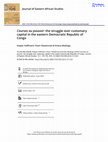
Journal of Eastern African Studies, 2020
This article analyses the production and reproduction of traditional chieftaincy in war-torn east... more This article analyses the production and reproduction of traditional chieftaincy in war-torn eastern DR Congo, through the case of a succession dispute in Kalima (South Kivu). Kalima has gone through two decades of political instability and violent conflict involving a plethora of local, national and regional actors. During this period of uncertainty and upheaval, the institution of traditional chieftaincy has remained politically salient. We argue, that this salience is conditioned by a widespread belief in the authenticity and sacredness of the institution of traditional chieftaincy and by the ethno-territorial imaginary of the Congolese political order. Both of these are historically produced through rituals, ceremonies and narratives of origin. They imbue the institution of traditional chieftaincy with charisma and enable customary chiefs to accumulate resources and exercise authority in a wide range of domains of public life in rural eastern Congo. Drawing on Pierre Bourdieu, we call this ability to rule through the notion of 'custom', customary capital. However, we also show that 'customary capital' does not automatically accrue to chiefs as a variety of internal and external actors vie for customary capital. As such it fluctuates over time as different actors move in and out of the capacity to legitimately wield customary capital.
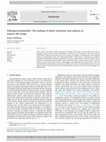
Geoforum, 2019
In this article I investigate colonial constructions of ethnicity and territory and their effects... more In this article I investigate colonial constructions of ethnicity and territory and their effects in the post-independence period in eastern Democratic Republic of the Congo. The core argument of the article is that the constructions of ethnicity and territory that are set in motion in struggles over political space in the Congolese conflicts are conditioned by what I call "ethnogovernmentality", which denotes a heterogeneous ensemble of biopolitical and territorial rationalities and practices of power concerned with the conduct of conduct of ethnic populations. Through ethnogovernmentality colonial authorities sought to impose ordered scientific visions of ethnicity, custom, culture, space, territory, and geography, upon ambivalent cultures and spaces. I show that while ethnogovernmentality failed to produce the stability and order the colonial authorities sought, its ethno-territorial regime of truth and practice has had durable effects on people's sense of self and on struggles over political space.
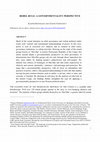
African Affairs, 2018
Much of the recent literature on rebel governance and violent political orders works with ‘centre... more Much of the recent literature on rebel governance and violent political orders works with ‘centred’ and instrumental understandings of power. In this view, power is seen as exercised over subjects, and as situated in rebel rulers, governance institutions, or ruling networks. Drawing on the study of the armed groups known as ‘Mai-Mai’ in eastern Democratic Republic of the Congo, this article instead adopts a governmentality per- spective on rebel governance. It demonstrates how Mai-Mai groups rule not only through direct imposition but also, more subtly, by shaping peo- ple’s subjectivities and self-conduct. We identify four clusters of techni- ques of Mai-Mai rule that relate respectively to ethnicity and custom; spirituality; ‘stateness’; and patronage and protection. We argue that a governmentality perspective, with its focus on rationalities and practices of power, offers a fine-grained understanding of rebel rule that moves beyond common binaries such as coercion versus freedom. By showing its relevance for the analysis of rebel rule in the eastern Congo, our find- ings further strengthen the case for applying a governmentality perspec- tive to non-Western political orders.











Uploads
Papers by Kasper Hoffmann
This report analyses the involvement of these armed groups in public life in the territories of Kalehe and Walikale, which is the outcome of the intersection of a number of local historical processes with larger national and regional dynamics. The current political and military landscape in these territories, defined by the presence of armed groups and the consequent fragmentation of local authority, is mainly caused by unresolved tensions between and within communities over territory, authority and resources; the lack of capacity of the Congo’s state services to provide protection; and the limited success of reintegration efforts. The report explores how these armed groups are embedded inlocal communities, how they are connected to local power struggles and how they are involved in the exercise of local authority, including in the fields of security, dispute resolution and revenue generation. Armed groups are able to mobilize popular support by evoking two issues of existential importance to local communities—marginalization and security. While the former revolves around the historical marginalization of local communities in politics and governance, the latter frames local communities as in need of protection. These issues give meaning to armed groups’ bids for local authority and legitimize their engagement in a wide range of governmental practices normally ascribed to the state, such as taxation and the provision of justice and security.
Armed groups have evolved into dominant power brokers, which are deeply involved with ruling territory, people and resources. They have become part and parcel of local and sometimes national power dynamics, have colluded with local and national political and customary leaders, and have developed different techniques and strategies to impose or sustain their authority. The end result is further militarization and fragmentation of public space and social interactions.
In order to reverse this dynamic and promote a demilitarization of public life in Walikale and Kalehe, it is first essential to address the civilian support networks of armed groups. It is then equally important to deal with more structural causes of militarization, including the conduct of the security forces, and to promote more transparent and accountable state institutions. Two other issues that are interconnected and require specific attention are the return of refugee populations and disputes over landownership. These cannot be resolved without a genuine national land reform process, which requires the mobilization of the necessary political will and technical capacity.
Books by Kasper Hoffmann
Peer reviewed artikels by Kasper Hoffmann
This report analyses the involvement of these armed groups in public life in the territories of Kalehe and Walikale, which is the outcome of the intersection of a number of local historical processes with larger national and regional dynamics. The current political and military landscape in these territories, defined by the presence of armed groups and the consequent fragmentation of local authority, is mainly caused by unresolved tensions between and within communities over territory, authority and resources; the lack of capacity of the Congo’s state services to provide protection; and the limited success of reintegration efforts. The report explores how these armed groups are embedded inlocal communities, how they are connected to local power struggles and how they are involved in the exercise of local authority, including in the fields of security, dispute resolution and revenue generation. Armed groups are able to mobilize popular support by evoking two issues of existential importance to local communities—marginalization and security. While the former revolves around the historical marginalization of local communities in politics and governance, the latter frames local communities as in need of protection. These issues give meaning to armed groups’ bids for local authority and legitimize their engagement in a wide range of governmental practices normally ascribed to the state, such as taxation and the provision of justice and security.
Armed groups have evolved into dominant power brokers, which are deeply involved with ruling territory, people and resources. They have become part and parcel of local and sometimes national power dynamics, have colluded with local and national political and customary leaders, and have developed different techniques and strategies to impose or sustain their authority. The end result is further militarization and fragmentation of public space and social interactions.
In order to reverse this dynamic and promote a demilitarization of public life in Walikale and Kalehe, it is first essential to address the civilian support networks of armed groups. It is then equally important to deal with more structural causes of militarization, including the conduct of the security forces, and to promote more transparent and accountable state institutions. Two other issues that are interconnected and require specific attention are the return of refugee populations and disputes over landownership. These cannot be resolved without a genuine national land reform process, which requires the mobilization of the necessary political will and technical capacity.